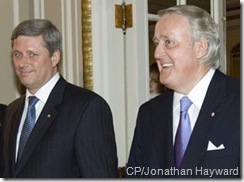One of the better blogs around is written by Gary Kelly; Gary offers sharp writing on diverse topics backed by research and accompanied by links.
Regular Bond Papers readers will recognized the links labeled Top o' the Pile. That's where Gary belongs and that's where he is now.
In a post last week, Gary discussed an issue that arose over his use of a photograph from the Western Star. The Corner Brook daily took exception to Gary's uncredited use of one of their images, which Gary freely acknowledges was the case. He also linked to the original story, so, as Gary notes, he wasn't stealing their bandwidth. Gary took down the photo.
While I technically understand the position of the Western Star in asking me to take the photo down, I have to question the we vs. us mentality.
You know what really must frighten the Western Star? I took the photo down four minutes after receiving their email. How long would it take them to do that? How long does it take to print a retraction?
You know what else must frighten the Western Star? If you do a Google search for Corner Brook City Hall - this blog comes up third on the list. I have no fixed costs compared to the local newspaper. That could be the subject of an entire blog all by itself.
Honestly, Gary might find that not to be the issue so much as the uncredited use of the Star's intellectual property. Gary cites some statistics on blog traffic and the value of blog links. He might be right but there might be a way of coming to an agreement with the Star's editorial board that would work for both sides.
Using photographs is an issue that all bloggers come across at some point. Over the past two and a half years, Bond has has taken to giving a photo credit unless the photo comes from the anonymous pile of stuff that is just untraceable. Yes, as some have noted, Bond has used commercial shots, like say the Simpsons, but more often than not, photos come from Canadian Press, the CBC or the Telegram.
 Most Bond posts these days are composed on Windows Live Writer and that piece of software has been a godsend. The picture handling feature allows for watermarks to be included and that's where the credit goes, as in this shot by Jonathan Hayward of Canadian Press. Adding credit in this way doesn't detract from the image and it makes damned sure everyone knows where it came from.
Most Bond posts these days are composed on Windows Live Writer and that piece of software has been a godsend. The picture handling feature allows for watermarks to be included and that's where the credit goes, as in this shot by Jonathan Hayward of Canadian Press. Adding credit in this way doesn't detract from the image and it makes damned sure everyone knows where it came from.
 In one of the most popular photos at Bond - voted by reader calls and e-mails - the origin of the shot is actually contained in the lower right on the original. Yep. It's from the Mother Corp, so there's no additional credit listed.
In one of the most popular photos at Bond - voted by reader calls and e-mails - the origin of the shot is actually contained in the lower right on the original. Yep. It's from the Mother Corp, so there's no additional credit listed.
CBC has a fairly extensive policy on the use of its online materials and, as with the Star in all likelihood, the Corp will defend its copyright. Any time any copyright holder has exerted his or her rights, Bond has responded accordingly. In some cases, pictures have been removed. In others, the copyright holder has given express permission based on certain conditions being met. It isn't always a matter of money changing hands - sometimes it is sufficient that credit be given to the creator of the intellectual property.
Blog writers should understand that simple concept since they generate intellectual property of their own. While it's done for free and made readily available through the Internet, people shouldn't be claiming ideas, words or phrases contained on blogs without some measure of credit.
More often than not, Bond has been able to operate successfully using photographs and other images based on the understanding that this is not a competitor of the originator. In other words, a blog like Bond Papers isn't a news outlet like the CBC or the Telly and it isn't a commercial enterprise.
Maybe that makes a difference.
Maybe the Star will take a different view. It might only take an e-mail from Gary back to the managing editor proposing a straightforward arrangement. If Gary can demonstrate through his traffic statistics the value of his links, then the Star might relent. Editors and producers aren't usually stunned. In fact, Gary will likely find that most of them are interested in working out a problem to the benefit of all concerned. After all, rather than competing with news organizations, blogs can add to the mix of opinion and commentary and sometimes serve as leads to stories. The whole thing can work for all concerned. it just has to start with an appreciation by one for the other.
-srbp-